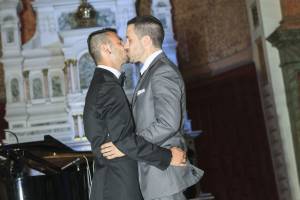In 1976, the Episcopal Church (the branch of the Anglican church in the United States) took steps toward marriage equality when it recognized that “homosexual persons are children of God who have a full and equal claim with all other persons upon the love, acceptance, and pastoral concern and care of the Church.” In 2015, the General Convention made changes to church canon and liturgy for marriage equality. Months later, at the Anglican Communion’s Primates’ Meeting, the primates, who are the head bishops of the church, voted to suspend the right of the Episcopal Church to be represented at international meetings. This summer, the Canadian Anglican Church is expected to vote on same-sex marriage equality for its membership. The debate has been going on for months, and it’s not looking positive, but there are people who are pushing forward.
Same-Sex Marriages and the Anglican Church
The General Synod, which is the body responsible for church canon, has been trying to find agreement over same-sex marriages in the church since 2004 when they deferred the vote over blessing the union or not. This would have given each church the authority to bless unions. One of the bishops had already given permission for some of the priests in his district to bless same-sex unions as early as 2003. Currently, there are many parishes that are authorized to bless all marriages, but the church itself has not approved the change to the marriage canon.
This July, the General Synod is voting on a change to the canon at its triennial meeting. According to the final report presented to the Commission on the Marriage Canon,
“In 2013 the General Synod passed a resolution (C003, which is included as an appendix to this report) directing the drafting of a motion ‘to change Canon XXI on marriage to allow the marriage of same-sex couples in the same way as opposite-sex couples, and that this motion should include a conscience clause so that no member of the clergy, bishop, congregation or diocese should be constrained to participate in or authorize such marriages against the dictates of their conscience.’ Such a motion will be considered by the General Synod in 2016.”
After a special meeting early in February, the House of Bishops announced that the resolution would probably not pass because it would not get the support it needed to pass. It takes a two-thirds majority to pass, and according to an article in the Anglican Journal, one-third of the bishops are in favor of the change. Another third of the bishops are opposed. The remaining third are those bishops who are still wrestling with the issue. There is another meeting in April to provide more thought and alternatives to the resolution before the final vote in July.
Social Media Comes to the Rescue
Just a few days following the statement from the Bishops, advocates of the resolution came together and formed a Facebook group, Advocates for Changing the Marriage Canon. It started out with 25 members in March, and it has grown to almost 1400. Both clergy and laypeople are in the group. Administrators must approve the request to join, or you must be invited by another member. The rules are clear that the group is not there to debate the issue. It is strictly for those who are in support of the resolution. Members have reached out to the leaders in the church, expressing their views about why this resolution is so important to the church and to their faith. The group is actively reaching out to the House of Bishops, but it also is serving a purpose of unity among Anglicans who feel marginalized because their marriages are not recognized by church canon. We’ll be watching this issue to see how it turns out when the Bishops vote in July.



